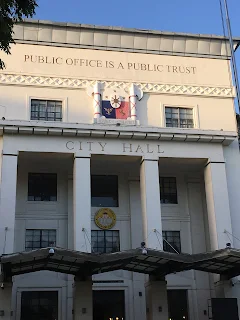As a young reporter in Cebu city, I did not cover City Hall. That beat used to belong to Sol, who always landed in the banner headline almost everyday. I did not cover Capitol, either. That beat belonged to Michelle, who also used to grab the headlines with Sol. I did not, could not cover the police beat, supposed to be the training ground for young reporters. Instead, I was made to cover the business and economic beat, not because I was a smart ass but because no one my age and fresh from school would dare cover such a beat. In fact, the one covering it was Pops, an octogenarian so aloof I was afraid of him. I treated him like a sage. He always had sums of money, running in the millions, on his head. I knew it because that was always what came out of his mouth when he stood talking with presidents of the Chamber, another scary thing I had to contend with. Pops used to wear a gray beret that covered his balding head. It gave him an air of style and prominence.
Reporters my age used to describe the business beat as difficult, boring, full of economic jargons one can't understand, numbers, figures, charts. How can you make a story out of mere charts and numbers, no narrative, from BIR, from SEC, or from Neda? But my editor taught me how to make the numbers talk.
Even during those times, I already had the ability to sit straight quietly and listen as somebody explained to me the workings of the Norwegian ship. Maybe, it was a result of some neglect I might have suffered in childhood because I could sit there for hours listening to a farfetched subject without complaining. Towards the end of the day, I would hurry back to the newsroom to write the story. My business editor would be waiting for it, as if it were a matter of life and death. She would ask as soon as I opened the door, "So, what's your story?" and I would stare at her, mouth open.
So, I'd never open the door again if I was not sure of the story.
Our newsroom was on the second floor, so even before I could take the stairs, I would be composing the lead and two supporting paragraphs in my head to give her a ready answer. Sometimes, I would go to the toilet before opening the newsroom door. The toilet was just near the newsroom door. You can write your lead and two supporting paragraphs in the toilet.
I was still a dreamy-eyed and clumsy young reporter then. I never actually fully understood what was going on with my life.
One afternoon, after spending long hours with Norwegian engineers piloting a shipping project in the city, I was already three steps to the newsroom door when I realised I no longer had my notes with me. I panicked. Where could have I left my notebook? Did I drop it in the jeepney? I was about to go back to chase the jeepney when I realised--how could I do that?! There were lots of jeepneys plying the city. How would I know which was the one I was riding?
So, right then and there, I tried to recall the story. I loved those Norwegians so much. Just like me, they'd be easily dismissed as boring and they never spoke English that fast. They spoke English slowly, as unsure as I was. I could ask them over and over again about the basic concept of their machine and they'd never tire explaining it to me. So, more or less, I already had the story in my head. I can even approximate a quotation, knowing their Norwegian English well. Yes, it was really, really painful to retrieve jottings from a lost notebook in your own mind. It was hell. The story made it to the business page's banner headline the following day. But from then on, I really made sure not to lose my notebook again.





